
Chat Bots to Street Law: Building Quick and Affordable Legal Services in Nigeria
As part of WJP's Rule of Law Solutions Initiative, World Justice Project researcher and ACLS Mellon Fellow Joe Haley speaks with the founder of LawPàdí, a legal empowerment platform. LawPàdí pairs a legal referral service with innovative approaches to legal education, such as street law clinics and automated chat bots, in order to help Nigerians resolve their most common civil justice problems. The conversation touches on the security ramifications of access to justice in the Sahel, and dives into measures of program impact, the role of legal self-help, the strategic use of data, and the importance of building public trust. Ultimately, Ibidapo-Obe shares his vision for a streamlined system of justice in Nigeria.
In March, World Justice Project researcher and ACLS Mellon Fellow Joe Haley traveled to West Africa to interview local government officials and civil society activists. The purpose of this field research was to understand how access to justice — the capacity of ordinary people to resolve their everyday justice problems fairly without undue hardship — works in the Sahel, a semi-arid region that snakes along the southern edge of the Sahara desert, from Senegal and Mauritania in the West to Sudan and Eritrea in the East.
The Sahel is marked by high levels of poverty and environmental fragility. It is also host to one of the world's most intractable conflicts. Since 2012, national and international forces have been locked in a pitched fight against Islamic extremists in Mali, Niger, and Chad. This conflict has had profound implications for West and Central Africa, as it has disrupted economic activity and displaced hundreds of thousands of people. In this Rule of Law Solutions: Access to Justice in the Sahel series of reflections and interviews with local practitioners, Joe asks, how can access to justice build peace and resilience in the Sahel?
Interviewees:
- Babatunde Ibidapo-Obe, Founder and CEO of LawPàdí







